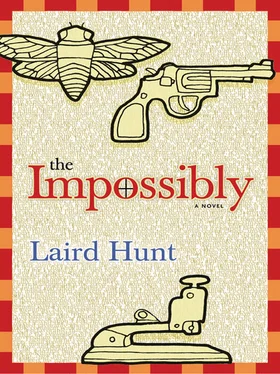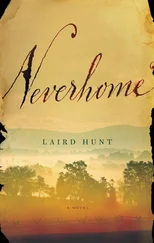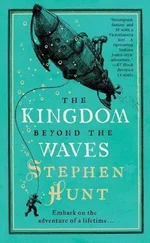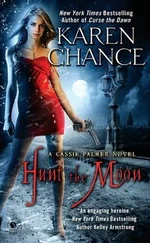We were not so alone, however, walking, as the walking together business was new.
Although the park with its light wind and scattered crowds and bursts of pigeons was lovely.
My friend is in town, I said.
Really? she said, so is mine.
We exchanged names of friends.
That’s funny, she said.
She laughed.
She had a beautiful laugh, just beautiful, like that.
John and her friend Deau later met at the event and stood in the corner, in the kitchen I think, talking together for a long time. I think, if I remember correctly, John spilled some wine on Deau, or was it the other way around?
As I say, it was funny, somehow, the name business, and the fact of the effect on me of her laugh.
Later, in another city, a city on the coast, we walked together down a sloping street toward a harbor, and, this is why I even mention it, she laughed again.
That was because of a pair of monkeys.
So.
She asked me if I was ready to meet her friend and to see her apartment, and I said, yes.
We had, now, definitively it seemed, reached the period of the end of the warm weather and the beginning of the cold, and it would be some time, if ever, before we could comfortably recommence our meetings in the park. This is what I thought as we walked along and talked about various words and objects, though also, and I suppose this was a function of the changes that were in the process right those seconds of occurring, about other things.
She was asking me was I interested.
In what? I said.
She told me what it was.
I said I was, then I didn’t say anything for a moment, then I said, yes, definitely.
At times, you see, after I was no longer hearing it, I was still hearing it — I am still hearing it — her voice, in a slight but quite crystalline echo, perfectly. This was distracting, and, when it was happening, often caused her to wonder aloud about what I was thinking.
We had not yet developed a vocabulary that could accommodate, in this line, any kind of elaboration.
I’m not quite sure, I would say.
And she wouldn’t say anything.
Then we arrived at her apartment. I have already mentioned the impossible number of shelves that coexisted in those few rooms. It was a dizzying spectacle, one no doubt exacerbated by the number of objects those shelves supported. Obviously, the number of objects, of which there were many, many per shelf, must, in real terms, have far exceeded the number of shelves, but in my mind, strangely it does not. In my mind, strangely, there are more shelves than objects, and, accurate or not, this was the case right from the start.
Deau was not there. She had left a note. In which, in a large, round hand, she explained that she had just popped out. I have never been able to subtract that large, round “popped” from my impression of Deau, though I admit I haven’t tried.
Her apartment. There was the stapler, in its place, and there was a shiny bright hole puncher, much like the one belonging to my downstairs neighbor, and there was an electric pencil sharpener, not plugged in, and there was a pyramid composed of twenty perfectly white rectangular erasers. In the kitchen, on one of the shelves that had not yet been filled but that would soon be, sat the ricer, next to a small blue colander, next to a short stack of red condiment dishes, next to a white crock pot, slightly cracked at the rim, next to a large green bowl.
More.
There was a lot more.
I told her I was impressed by the number of objects she had accumulated.
She told me to come over to the bed.
Eventually, Deau popped back in.
It was a very large apartment and despite the proliferation of shelves and objects we all, once the two of us had dressed, sat at a great distance from each other.
Hello, Deau called across the room to me.
Hello, I called back.
One of my unpleasant dreams involves the inadequacy of my voice to carry across even short distances, and while perhaps you wouldn’t think that was much of a dream, I can assure you that it is quite effective.
I forget at which point we moved our chairs closer and had drinks.
Doing so was Deau’s suggestion.
This is slightly stupid, she said.
Deau, coincidentally, was about to begin a tour of some kind, and she was going to begin it in the next place she went, this first place being a preliminary stop, connected to, but not a part of, she said, her tour. I told her that my friend, John, was also on a tour, but that he had long since gotten it started, and that this was by no means a preliminary stop, and that it seemed to be doing him worlds of good.
Who is your friend John? said Deau.
I looked at her.
She looked a little like her handwriting.
If her handwriting had also been slightly, perhaps, serrated.
Hmmm, I thought.
Just exactly what kind of a tour are we talking about, Deau? I considered asking her, only it was a question I hadn’t even asked John.
Actually, I had never asked John much of anything, and still haven’t. I had, I remember sitting there thinking, once asked him where he was from, and he had taken me there, and had both shown and introduced me around.
Say hello to my mother.
What do you mean?
I mean say hi to Mother, come over here.
I don’t think so.
Get over here.
What the fuck is that?
The conversation took a turn, it took several turns.
At one point I was informed by Deau that I was now in the presence of a young woman who was both wonderful and very strange, which combination of descriptives seemed to add up in Deau’s mind to pleasantly eccentric.
Who are you talking about? I said.
We all three looked for a moment around the room with all its shelves.
I remember at this juncture thinking it was pretty strange to keep a stapler on a shelf you couldn’t easily reach. I also remember feeling distinctly uncomfortable at having been made privy to Deau’s opinion, presumably about the woman I was smitten with, no matter how well-informed, or, especially because it was well-informed, and I remember suddenly wishing that it was still warm out and that we were still sitting at the café near the tree.
Why is the stapler sitting way up there where you can’t reach it? I asked.
At this, she smiled, leaned forward a little, and said, I didn’t put it there for me.
Who is it for then?
She didn’t answer.
Oh, I said.
Stand up and see, she suggested.
I did. And found the stapler perfectly in reach of my outstretched hand. There was a short stack of multicolored paper sitting next to it. I picked up a couple pieces, placed them under the chisel end of the stapler, and pressed. There again came the short, crisp clunk resulting, this time, in sheets of blue and turquoise paper being crisply joined.
I don’t know.
I found it strange, and in fact despite all of it, persist in finding it strange, to have been thought of, in some way so exactly, while I wasn’t there.
The whole business, if you will indulge me for a moment, made my arm feel like a treasure.
Thank you, I said.
John had the event all organized. It was up to me to pick up the chips and the pretzels and the small pickles, or anyway fairly small pickles just not big ones, and the crackers and the meats, and it was up to me to pick up the liquid things too. I started with the meats and pickles. The ones I found were plenty small and rather handsome. I then acquired a variety of meats in several forms and brought them home, and then went back for the crackers and chips and pretzels and some cheese too, I decided, and more chips and some nuts for variety. Then I moved on to the liquid refreshments. What a glory is a beverage store. It is too many colors and too many varieties of shapes of container, and all the containers contain too many different kinds of liquids, and too much, and that they slosh, that it is in their nature to slosh, and that too many of them I had known too well and too recently.
Читать дальше










![Беар Гриллс - The Hunt [=The Devil's Sanctuary]](/books/428447/bear-grills-the-hunt-the-devil-s-sanctuary-thumb.webp)

